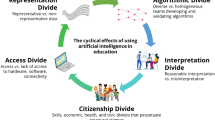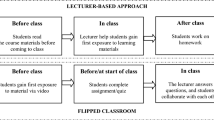Abstract
In this ethnographic study, I will show that students at Czech university departments employ copying strategies as part of the dominant educational practices centred on the ‘replication’ of authoritative knowledge. In the teaching/learning situations that we observed, teachers ‘transmit’ knowledge to students, who are expected to ‘replicate’ it in exams, which students manage by either memorization or copying; either way, students are excluded from knowledge construction. This educational configuration is re/produced not just by students and teachers but also by buildings and spaces built for frontal instruction; by projection technologies transmitting fixed knowledge; by students’ community websites that enable sharing and electronic replication of lecture or crib notes; and by public policies of higher education funding or quality assurance. In conclusion, I will argue that many fundamental aspects of research on student so called ‘cheating’ need to be re-examined because this study demonstrates that student copying is integral to the dominant configuration in Czech higher education. This ‘normality’ of student copying challenges the moralist consensus of the literature, expressed in the very term ‘cheating’ as well as in proposals to counter student copying by instilling academic integrity in students, while ignoring complex higher education configurations.
Similar content being viewed by others
Notes
Vignettes and quotations in this article are based on ethnographic fieldnotes that were written down predominantly in Czech and then translated into English for the purposes of this article. Some fieldnotes were taken in English when it was the medium of instruction and conversation.
References
Ambrose, S. A., Bridges, M. W., DiPietro, M., Lovett, M. C., & Norman, M. K. (2010). How learning works: seven research-based principles for smart teaching. San Francisco: Jossey-Bass.
Anderman, E. M., & Murdock, T. B. (Eds.). (2007). Psychology of academic cheating. Burlington: Academic Press.
Ariely, D. (2012). The honest truth about dishonesty: How we lie to everyone-especially ourselves. New York: HarperCollins.
Ashwin, P., Abbas, A. & McLean, M. (2013). Representations of a high-quality system of undergraduate education in English higher education policy documents. Studies in Higher Education, [online ahead-of-print], DOI: 10.1080/03075079.2013.842211.
Biggs, J. (2012). What the student does: Teaching for enhanced learning. Higher Education Research & Development, 31(1), 39–55.
Bouville, M. (2008). Cheating and neutralization. http://www.mathieu.bouville.name/education-ethics/Bouville-cheating-neutralization.pdf. Accessed 20 January 2014.
Bouville, M. (2010). Why is cheating wrong? Studies in Philosophy and Education, 29(1), 67–76.
Braxton, J. M. (2011). Improprieties in teaching and learning. In T. B. Gallant (Ed.), Creating the ethical academy: Systems approach to understanding misconduct and empowering change (pp. 63–81). New York: Routledge.
Davis, S. F., Drinan, P. F., & Gallant, T. B. (2009). Cheating in school: what we know and what we can do. Chichester: Wiley-Blackwell.
Fonseca, L. (2012). Can schoolcheating ever be regarded as a responsible behavior? Conference ECER 2012, The Need for Educational Research to Champion Freedom, Education and Development for All. http://www.eera-ecer.de/ecer-programmes/conference/6/contribution/16836. Accessed 20 January 2014.
Fonseca, L. (2013). “Všichni vědí, že opisovat se nemá, ale stejně to každý dělá”: Pedagogický pohled na paradoxy “férového” opisování. Studia Paedagogica, 18(2–3), 73–92.
Gallant, T. B. (Ed.). (2011). Creating the ethical academy: Systems approach to understanding misconduct and empowering change. New York: Routledge.
Jordan, B. (1997). Authoritative knowledge and its construction. In R. Davis-Floyd & C. Sargent (Eds.), Childbirth and authoritative knowledge: Cross-cultural perspectives. Berkeley: University of California Press.
Keeling, R. P., & Hersch, R. H. (2011). We’re losing our minds: Rethinking American higher education. New York: Palgrave Macmillan.
Kohn, A. (2007). Who’s cheating whom? Phi Delta Kappa, 89(2), 89–97.
Lang, J. M. (2013). Cheating lessons: Learning from academic dishonesty. Cambridge: Harvard University Press.
Lathrop, A., & Foss, K. (2005). Guiding students from cheating and plagiarism to honesty and integrity: Strategies for change. Westport: Libraries Unlimited.
Linková, M., & Stöckelová, T. (2012). Public accountability and the politicization of science: the peculiar journey of Czech research assessment. Science and Public Policy, 39(5), 618–629.
Martin, D. E., Rao, A., & Sloan, L. R. (2009). Plagiarism, integrity, and workplace deviance: A criterion study. Ethics and Behavior, 19(1), 36–50.
McCabe, D. L., Butterfield, K. D., & Treviño, L. K. (2012). Cheating in college: Why students do it & what educators can do about it. Baltimore: Johns Hopkins University Press.
Melichar, M., & Pabian, P. (2007). Shifting peripheries: a state of the art report on the Czech academic profession. In W. Locke & U. Teichler (Eds.), The changing conditions for academic work and career in select countries (pp. 37–56). Kassel: INCHER.
Miller, A. D., Murdock, T. B., Anderman, E. M., & Pointdexter, A. L. (2007). Who are all these cheaters? Characteristics of academically dishonest students. In E. M. Anderman & T. B. Murdock (Eds.), Psychology of academic cheating (pp. 9–32). Burlington: Academic Press.
Murdock, T. B., Miller, A. D., & Goetzinger, A. (2007). Effects of classroom context on university students’ judgments about cheating: mediating and moderating processes. Social Psychology of Education, 10(2), 141–169.
Murphy, M. (2009). Buying A’s and counting FTEs: Plagiarism, consumerism, and the economics of higher education. In T. Twomey, H. White, & K. Sagendorf (Eds.), Pedagogy, not policing: Positive approaches to academic integrity at the university (pp. 35–41). Syracuse: Graduate School Press of Syracuse University.
Nathan, R. (2005). My Freshman year: What a professor learned by becoming a student. Ithaca: Cornell University Press.
Nespor, J. (1994). Knowledge in motion: Space, time and curriculum in undergraduate physics and management. London: Falmer.
Pabian, P. (2010). Czech Republic: research required but not supported. In S. Kyvik & B. Lepori (Eds.), The research mission of higher education institutions outside the university sector: Striving for differentiation (pp. 115–134). Dordrecht: Springer.
Preiss, M., Klein, H. A., Levenburg, N. M., & Nohavová, A. (2013). A cross-country evaluation of cheating in academia—a comparison of data from the US and the Czech Republic. Journal of Academic Ethics, 11(2), 157–167.
Prosser, M., & Trigwell, K. (1999). Understanding learning and teaching: the experience in higher education. Buckingham: Open University Press.
Pupovac, V., Bilić-Zulle, L. & Petrovečki, M. (2008). On academic plagiarism in Europe: An analytical approach based on four studies. Digithum, 10, http://www.uoc.edu/digithum/10/dt/eng/pupovac_bilic-zulle_petrovecki.pdf. Accessed 20 January 2014.
Sattler, S., Graeff, P., & Willen, S. (2013). Explaining the decision to plagiarize: An empirical test of the interplay between rationality, norms, and opportunity. Deviant Behavior, 34(6), 444–463.
Shin, J. C., Arimoto, A., Cummings, W. K., & Teichler, U. (Eds.). (2014). Teaching and research in contemporary higher education: Systems, activities and rewards. Dordrecht: Springer.
Teixeira, A. A. C., & Rocha, M. F. (2006). Academic cheating in Austria, Portugal, Romania and Spain: A comparative analysis. Research in Comparative and International Education, 1(3), 198–209.
Teixeira, A. A. C., & Rocha, M. F. (2010). Cheating by economics and business undergraduate students: an exploratory international assessment. Higher Education, 59(6), 663–701.
Twomey, T., White, H., & Sagendorf, K. (Eds.). (2009). Pedagogy, not policing: positive approaches to academic integrity at the university. Syracuse: Graduate School Press of Syracuse University.
Whitley, B. E., & Keith-Spiegel, P. (2002). Academic dishonesty: an educator’s guide. Mahwah: Lawrence Erlbaum.
Acknowledgments
This article has been written within the project ‘Ethnography of university departments: mass higher education in institutional settings’, supported by the Czech Science Foundation (GAP404/11/0127).
Author information
Authors and Affiliations
Corresponding author
Rights and permissions
About this article
Cite this article
Pabian, P. Why ‘cheating’ research is wrong: new departures for the study of student copying in higher education. High Educ 69, 809–821 (2015). https://doi.org/10.1007/s10734-014-9806-1
Published:
Issue Date:
DOI: https://doi.org/10.1007/s10734-014-9806-1




